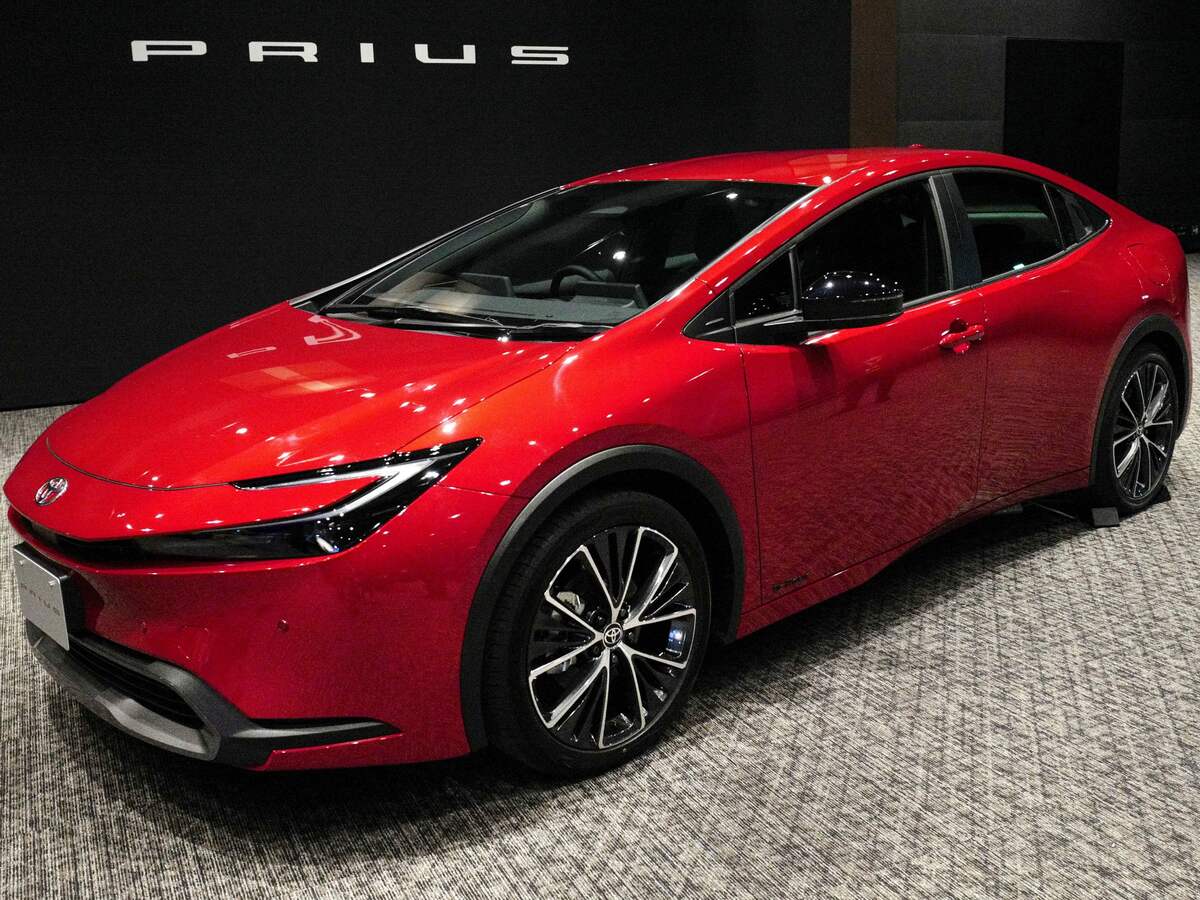
[ad_1]

Toyota unveils a brand new Prius throughout in Tokyo on Nov. 16, 2022. 1 / 4 century after Toyota launched the Toyota Prius, hybrids stay widespread with consumers.
Kazuhiro Nogi/AFP through Getty Images
disguise caption
toggle caption
Kazuhiro Nogi/AFP through Getty Images

Toyota unveils a brand new Prius throughout in Tokyo on Nov. 16, 2022. 1 / 4 century after Toyota launched the Toyota Prius, hybrids stay widespread with consumers.
Kazuhiro Nogi/AFP through Getty Images
1 / 4 century in the past, Toyota unveiled a revolutionary automobile: the Prius.
The Prius was the primary of a brand new class of vehicles, marrying an electrical motor to a gasoline engine to dramatically enhance gasoline economic system and scale back emissions.
Today, hybrid automobiles stay widespread with many drivers — enduringly widespread, throughout a rising variety of automobile segments. That’s whilst a brand new revolution is unfolding, with automakers investing many billions of {dollars} in all-electric automobiles, which do not use fuel in any respect.
Car consumers nonetheless like hybrids as a result of they will save on fuel, and reduce their carbon footprint with out having to take care of vary nervousness or the necessity to cost at house.
But whilst hybrids go mainstream, they’re shedding traction amongst their unique lovers: Environmentalists.
Many say it is time for hybrids to fade into historical past; that they’re at greatest a detour, and at worst an obstruction, within the struggle in opposition to local weather change.
“Right now we are facing a climate crisis, and we absolutely need to reduce our dependency on fossil fuel cars,” says Katherine Garcia, who directs the Sierra Club’s Clean Transportation for All marketing campaign.
Here’s what to know in regards to the environmental debate over hybrids.
Hybrids are a well-liked alternative with consumers
Hybrids might not get as a lot buzz as EVs, however they’re flying off dealership heaps.
Take Steve Bond, who was eying among the hybrids on show on the Washington D.C. auto present final month. “I think it’s time to go from straight gasoline for a hybrid model for the better mileage,” he stated, explaining why he thought a hybrid Toyota Highlander could be his subsequent automobile.
He’s thought of an electrical automobile, however he says the shortage of quick chargers for long-distance journey are protecting him from shopping for one right this moment.
He summed up his view on EVs in 4 phrases: “Yes — but not yet.”
Over within the Subaru exhibit, Carla Grenell additionally stated she’d be more likely to purchase a hybrid than an EV.
“If I were able to plug in at my home, I would do that,” she stated. But as a metropolis dweller she wasn’t certain if she may cost at house — many people can’t.
Michelle Krebs, government analyst with Cox Automotive, says these issues are widespread. And in consequence, hybrids are way more widespread with consumers than all-electric automobiles.
“About 11% of all new car shoppers look at EVs,” she says. “About 20% of all new car shoppers shop for hybrids.”
Actual gross sales figures are decrease, for each kinds of automobiles, as a result of there aren’t enough vehicles to meet demand. But the procuring figures present that lots of people need hybrids, if they will get their arms on them.
There at the moment are many extra hybrid choices
Initially, the Prius dominated the hybrid market. But right this moment hybrids have expanded, with choices in just about each phase, as Toyota and different automakers proceed to put money into them.
There are nonetheless smaller automobiles, just like the Prius, which simply bought a well-received redesign. (Sample review quote: “We can’t believe we’re writing this in a Prius review, but — the new Prius is…fun to drive!” ) And it nonetheless will get a cool 57 miles to the gallon.

Toyota unveiled one other model of the Prius on the North American International Auto Show in Detroit in January 2000. The Toyota Prius, first launched in Japan in 1997, was the world’s first mass-produced gasoline/electrical hybrid automobile.
Daniel Lippitt/AFP through Getty Images
disguise caption
toggle caption
Daniel Lippitt/AFP through Getty Images

Toyota unveiled one other model of the Prius on the North American International Auto Show in Detroit in January 2000. The Toyota Prius, first launched in Japan in 1997, was the world’s first mass-produced gasoline/electrical hybrid automobile.
Daniel Lippitt/AFP through Getty Images
But SUVs outsell small vehicles throughout the market, together with amongst hybrids. Toyota’s hybrid RAV-4 crossover (41 miles to the gallon) and hybrid Highlander SUV (36 mpg) far outsold the Prius final 12 months.
Kia, Hyundai and Honda all supply hybrid SUVs in quite a lot of sizes. And Toyota’s minivan, the Sienna, solely comes as a hybrid (36 mpg).
Then there are pickup vans. Ford sells a hybrid model of its F-150, and the favored Maverick — a smaller pickup designed to enchantment to city dwellers with a hankering for a truck — comes as a hybrid in its commonplace configuration. The Maverick will get about 42 miles to the gallon.
And on the sportier facet of the spectrum, Corvette simply launched its first hybrid: the E-Ray. The fuel mileage is not spectacular. But with an electrical motor in regards to the dimension of a Folger’s espresso can tucked between the entrance wheels, it is the quickest Corvette ever, able to going from zero to 60 in 2.5 seconds.
But are hybrids good for the planet at this second?
Right now, there’s a debate unfolding throughout the auto trade — between firms, advocates and authorities regulators — about whether or not hybrids are serving to or hurting within the present struggle in opposition to local weather change.
To state the plain, a hybrid automobile is healthier for the local weather and for human well being than a fuel guzzler.
But as they appear into the longer term, local weather advocates are now not emphasizing the necessity to make gas-powered vehicles extra environment friendly. They need to scale back the variety of automotive journeys taken, by investing in public transit and walkability.
And they need all new vehicles on the highway to be zero-emissions automobiles, which proper now, means all-electric automobiles, powered by a greener electrical grid. Such a transition poses daunting challenges — from constructing automobiles to sourcing battery minerals.
Garcia, with the Sierra Club, says it is important to tug off the transition to zero-emissions automobiles as quick as attainable. Every 12 months of delay locks in carbon emissions for years to come back given the more and more lengthy lifespan of automobiles on the highway.
“Every year that goes by we are going to be extending the pollution from transportation,” she says. “The truth is, we should have transitioned 20 years ago.”
These advocates are involved that every one the cash and engineering know-how invested into hybrids is cash and know-how that is not going into pure electrical automobiles, slowing down the transition.

Climate activist protest throughout a “Fridays For Future” local weather strike on September 23, 2022, in Chicago, Ill.
Kamil Krzaczynski/AFP through Getty Images
disguise caption
toggle caption
Kamil Krzaczynski/AFP through Getty Images

Climate activist protest throughout a “Fridays For Future” local weather strike on September 23, 2022, in Chicago, Ill.
Kamil Krzaczynski/AFP through Getty Images
Toyota makes the environmental case for hybrids
On the opposite facet of the talk, you could have Toyota.
While it revolutionized hybrids, the Japanese automaker has lengthy been vocally skeptical of EVs. As a consequence, it stays nicely behind its rivals within the race to carry them to market.
Today, Toyota has a brand new CEO who has indicated extra curiosity in all-electric automobiles. But the corporate continues to argue, to anybody who will hear, that hybrids can and must be a central element of combating local weather change.
“I guess we’re taking a pragmatic approach to this,” says Cooper Ericksen, a senior vice chairman at Toyota Motor North America accountable for battery electrical automobiles.
He factors out that hybrids are considerably cheaper than EVs to supply and to purchase, they usually do not require a charger. A automotive shopper should purchase a hybrid as a substitute of a standard fuel automobile with out having to vary their driving habits in any respect, making it a neater promote.
But even when all drivers had been completely able to leap to EVs, Toyota argues hybrids would nonetheless make sense. Because their batteries are a lot smaller, an organization can construct far, much more hybrids than EVs from the identical battery assets.
How will regulators regard hybrids?
The debate over hybrids is just not hypothetical. Regulators need to determine if their insurance policies have to concentrate on switching to EVs as quick as attainable, or on encouraging hybrids and their higher fuel mileage.
And in Europe, California and a variety of different states, policymakers have adopted the extra radical place, primarily mandating that every one new vehicles be zero-emission by 2035. That might depart room for plug-in hybrids, however wouldn’t permit standard hybrids, which require gasoline to run.
To perceive how regulators’ views have shifted, contemplate what’s parked within the driveway of Margo Oge, the previous director of the EPA’s Office of Transportation and Air Quality.
When the Prius first got here out, she was thrilled. “I was one of the first buyers,” she says. “I was excited because I want to walk the talk.”
These days, nonetheless, she’s driving an all-electric automobile. And she’s calling for her outdated company to set “ambitious” nationwide automobile requirements to speed up the shift away from all automobiles with a fuel tank – together with the Priuses she used to like.
Hybrids might as soon as have been revolutionary, however Oge says her drawback with them is straightforward: They nonetheless run on fossil fuels.
[adinserter block=”4″]
[ad_2]
Source link
